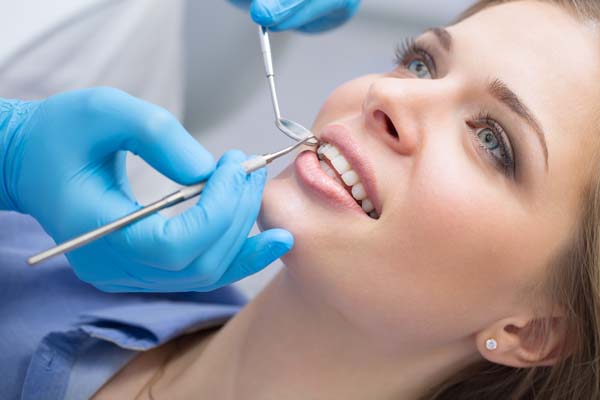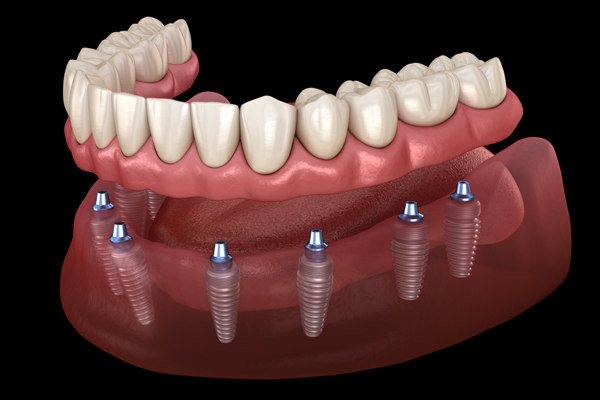What a Dentist Looks for During an Oral Cancer Screening

You should get an oral cancer screening one to two times a year, depending on your risk factors. During the screening, your dentist will ask some questions and then conduct a visual and physical exam. Your dentist will look for signs that indicate oral cancer. Find out what your dentist looks for during the exam.
About the oral cancer screening
Dentists can complete an oral cancer screening in 5-10 minutes. While the screening is short, the process is very thorough. Dentists check for all signs of oral cancer. If any signs are discovered, the dentist and the patient discuss the next steps.
Questions to determine risk factors
The dentist begins the exam by asking questions to determine the patient’s risk of developing oral cancer. If the patient is at risk for oral cancer, the dentist will recommend biannual screenings. Risk factors include using tobacco products, drinking large amounts of alcohol, HPV, prolonged exposure to the sun and a weak immune system. Eating a poor diet and failing to maintain an oral hygiene routine can also increase the risk of developing oral cancer.
Signs of oral cancer
During the visual and physical exam, the dentist will check for symptoms of oral cancer. Common signs include white or red patches located on the lips or in the mouth. The dentist also checks for bleeding sores that do not heal as well as lumps or hard spots. Crusted or roughened areas are also signs that the patient might have oral cancer. Also, the dentist needs to look for masses and nodules in the head, neck, mouth and jawline.
The dentist also looks for pain, tenderness numbness and swelling. Even if the swelling is not painful, it could be a sign that something is wrong. The dentist also checks the bite. Many people who have oral cancer experience changes in the bite. The teeth might not fit together the same way, and the dentist can use X-rays to look for changes.
Diagnosing oral cancer
The dentist does not diagnose oral cancer during the screening. Instead, the dentist looks for suspicious spots or abnormalities. If such a spot is discovered, a biopsy is recommended. The biopsied tissue is sent to a lab for diagnosis. If the biopsy indicates cancer, the patient will need treatment. Those who get regular oral cancer screening are likely to catch the disease in the early stages, which improves the prognosis.
Get screened for oral cancer
Oral cancer can spread if it is not diagnosed and treated. Go to your dentist so you can undergo a screening. Your dentist will begin by asking you questions. Then, your dentist will conduct a visual and physical examination to check for symptoms. If you have suspicious tissue, you will need to get it biopsied to determine if you have oral cancer. Finding oral cancer early can prevent it from spreading to other parts of your body, so schedule regular screenings with your dentist.
Request an appointment here: https://sexton-dental.com or call Sexton Dental at (740) 363-2080 for an appointment in our Delaware office.
Check out what others are saying about our services on Yelp: Read our Yelp reviews.
Recent Posts
Choosing between a dental crown and a filling depends on the extent of damage and the tooth's strength. A crown offers superior coverage by restoring the entire visible portion of a tooth. At the same time, fillings address smaller areas by sealing decay with materials such as resin composite, amalgam, or porcelain. No matter your…
For patients missing most or all of their teeth, implant-supported dentures provide a stable, natural-looking way to restore a full smile. This approach anchors a custom denture to dental implants placed in the jawbone for improved support. Within this category, patients often choose between fixed and removable designs. Understanding how each option works helps patients…
Dental bonding is a simple and effective way to make immediate improvements to the smile by covering stains or fixing small chips, cracks, and gaps in the teeth, providing immediate improvement. The process is painless and quick and does not require major changes to the natural teeth. Those looking for an easy and affordable way…
Dental implants can potentially survive a lifetime of use; however, the implant crowns used for chewing and biting are vulnerable to the same factors that can damage natural teeth. Therefore, it is important to take proper precautions to extend the crown's lifespan.The following are tips to add more years to an implant crown and reduce…


